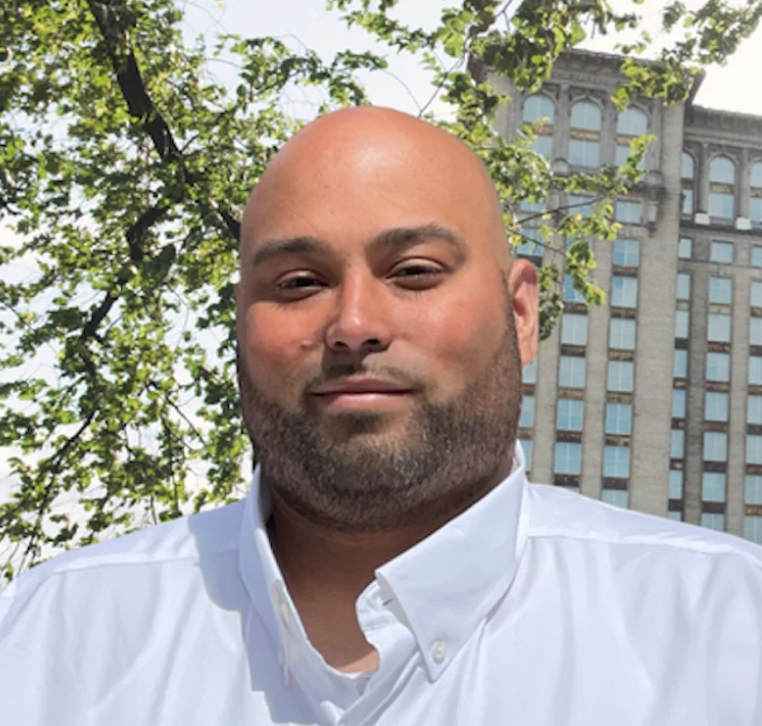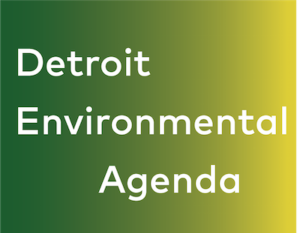Hector Santiago

Q: Where can people go to learn more about your biography? If not readily available online, please describe in 150 words or less, your relevant experience, public offices held (if any), involvement in environmental causes, and membership in any environmental organizations. If you currently hold office, describe any votes or actions demonstrating concern for the environment.
A: Growing up in Southwest Detroit, I learned the value of faith, community, treating others with respect, and hard work as the oldest of four kids. A graduate of Western High School, I excelled in the classroom and on the baseball field and was the first in my family to attend college. I am currently helping care for my father on dialysis, an experience that has given me a firsthand understanding of the importance of healthcare access.
Following a nonviolent offense charge, I qualified for the city’s Project Clean Slate program and successfully obtained expungement, giving me the opportunity of a second chance and inspired me to pursue public service. For nearly a decade, I’ve led a workforce development program dedicated to improving residents’ quality of life, job training, and expanding youth education opportunities for Detroiters. My direct work with returning citizens has helped hundreds of people overcome barriers to employment and get a second chance when most had counted them out of society.
In my spare time, I coach youth baseball, mentor in conflict resolution, and teach Sunday school. For me, the challenges facing Southwest aren’t just rhetorical — they are deeply personal. I am running for Detroit City Council to bring people together and get results for the community I am proud to call home. My fresh perspective, lived experience, and commitment to economic and social justice ensure I will be a strong voice for the people. I am running for Detroit City Council now because I want to do all I can to help the city that has never turned its back on me.
Community
Q: If elected, how will you work with Detroit residents to ensure that they benefit from and partake in the decision-making surrounding local development projects and that potential adverse impacts of those projects are identified, measured, monitored and mitigated? Moreover, how would you work to put more power into the hands of residents to maintain and revitalize their own communities and to access vacant land through the DLBA?
A: I am a firm believer that Detroiters need to be centered in anything going through city government. Municipal leaders are elected by Detroit residents and ought to be working for the people. More must be done to elevate Detroit-based and minority- and women-owned businesses in the contract process. There are also tough conversations to be had throughout the decision-making process to make sure Detroiters’ voices are heard. Rather than more backroom deals on major development projects, Detroit residents, who have proudly called our great city home for decades, deserve first priority access to the vacant land in the community in which they live, play and work. The people deserve a champion, and I am running to be that champion.
Q: If elected, what budget appropriations would you propose to increase investment in needed social and environmental services to help improve the quality of life and health of Detroit residents?
A: I want to work with my colleagues to get the funding needed for environmental services, I want to finally bring people together to get real results.
Public Health
Q: What long term solutions do you see for addressing vehicle speeds and making our streets safer?
A: Public safety is a main priority of mine as everyone deserves to live and work in a community that is safe. I am a father of two girls and know what it’s like to panic when I hear a car speed down our residential street while my daughters are playing outside. I support adding speed bumps, especially in neighborhoods that are disproportionately at a disadvantage and don’t have strong voices fighting on their behalf. Lower income neighborhoods and areas with high levels of seniors and young people need to be prioritized.
As someone who was born and raised in Southwest, I also know firsthand the damaging impacts large commercial trucks have on our local streets. We need to hold bad corporate actors accountable and get these trucks out of residential areas. Beyond the devastating air and noise pollution they leave behind, they also speed up the wear-and-tear of our roads that are already pothole ridden and increasingly unsafe.
Q: How will you work to reduce the negative health impacts of air quality on the residents of Detroit?
A: As a father of two and a youth baseball coach, air quality is a top concern of mine. I have also spent the last decade working at an environmental nonprofit and leading a workforce development program connecting people to good-paying green jobs. To say our air quality is a top priority of mine is an understatement as it’s what gets me out of bed in the morning. My experience in workforce development gives me an interesting perspective as I know how to bring environmental advocates and private sector groups together to find creative, thoughtful solutions that work for District Six residents and Detroiters as a whole.
Q: If elected, what actions will you take to work toward safer, healthier, and more affordable housing for all Detroiters?
A: We need affordable housing in the city. If I have the honor to serve, I will work with my colleagues on the Detroit City Council to secure resources for housing programs and initiatives through city, state, and federal funding. I am a firm believer that every person has a right to safe, quality, affordable housing, and it’s long past time for the city to make real change on this issue. Beyond funding and smart investment to expand affordable housing options, there must also be greater energy put towards holding shady landlords accountable so that residents are not taken advantage of. I’ve heard countless stories from residents who are renters about exorbitant fees, unsanitary living conditions, and little if any action from the city. That must change.
Energy
Q: What are your priorities to reduce emissions and lessen the impacts of climate change in Detroit during your term in office?
A: I want to work with the Green Task Force and bring businesses, environmental groups, and the City Council together to meet these goals and set ambitious ones after we meet them. Doing the bare minimum is insufficient — everyone must do their part to harness renewable energy’s potential, and make utilities more sustainable and affordable in the process.
Q: What are your plans for helping the city transition to renewable energy and how will you ensure that the cost benefits and increased resilience that come from the use of renewables is made accessible to low-income and vulnerable communities across Detroit?
A: While we have made some progress in recent years, there is a long way to go in making our community more resilient and renewable-friendly. On the City Council, I will be a vocal champion for renewable energy in Detroit, especially in our most vulnerable neighborhoods. Too often, the top barrier to entry when it comes to energy efficient and renewable appliances and other technology is cost. But such investments pay for themselves over the long run, and it’s up to city, state, and federal leaders to lower those barriers for consumers and work with public and private partners to expand renewables’ footprint in Detroit. Incentives, including tax credits and rebates, help, but still leave out a big part of the population who live paycheck to paycheck, are below the poverty line, and cannot afford large purchases with the latest technology. Costly and predatory financing schemes are also not the answer, so I would ensure consumer advocates have a seat at the table as well.
Recycling
Q: How can the city increase recycling, composting, and the use of post-consumer recycled materials, while addressing the city’s litter and illegal dumping problem?
A: We need the city’s recycling to expand. I recently talked with a resident who shared that many who live in apartment buildings do not get the opportunity to recycle. We need to change that by incentivizing recycling, block by block. There also needs to be education on the issue because beyond the positive environmental benefits, there is an information gap on the economic upsides of when people reduce their use of single-use items and dispose of materials properly.
Jobs
Q: What steps would you take to prepare the local workforce to take advantage of and be part of the movement toward a green economy, through qualifying for good paying infrastructure and clean energy jobs, amongst others?
A: I’ve spent the last decade doing just that at the Greening of Detroit. Through our program, we connect participants with training and enrichment opportunities in the community. All of our projects are identified with sustainability and building a greener, cleaner city as a core goal. Another key objective is equipping participants with the skills and experience needed to prepare them for green jobs. Our workforce training and educational programs help set Detroiters of all ages, from high school students up for success in the environmental sector. If elected, I would continue that work and leverage my relationships in the space to grow mentorship and development programs, expand visibility of these types of programs, and scale to schools across the city. Our young people cannot be what they cannot see, but when we show people what is possible for our shared future, the potential is unlimited.
Water
Q: How will you ensure that clean water is accessible and affordable to all Detroiters?
A: I will always fight for clean, affordable water for Detroiters because the ability to pay one’s bill shouldn’t determine one’s access to an essential need. The quality of our infrastructure must be a top priority, and the challenges presented by lacking investment are only further exacerbated by the climate crisis. Water affordability has been an issue for years in Detroit, and the cost of inaction to repair and replace our crumbling infrastructure will only cost us more in the coming years.
Q: How will you help municipal agencies and property owners integrate Green Stormwater Infrastructure (GSI) across the city to manage stormwater and reduce drainage charge fees for property owners?
A: We need to prioritize green, sustainable infrastructure to make Detroit more resilient in the face of climate change, the existential crisis of our time, and pollution. Costly maintenance, inconsistent funding, and changing weather patterns are just a few of the factors that have contributed to our infrastructure crisis. As a result, too many residents are forced to confront flooding challenges, year after year, and the property damage that comes along with it.
If elected, I will look to other municipalities in the United States and elsewhere that have been leaders in this space to learn more about their experiences and best practices. Beyond adopting solutions from models elsewhere, Detroit is home to innovative minds, and I would look to community members as well as hear from residents about their ideas. The people in our neighborhoods know their blocks best, so they may have solutions that are well suited to scale across the city.
Optional
Q: Please identify the top environmental concerns to you personally, identify the environmental issue in your community that is the most pressing, and what you would like to do as an elected official to address this most pressing concern.
A: As a father and youth baseball coach in our community, I am very concerned about air and water quality. Not only do these issues impact our daily lives in a real way, especially for people with compromised immune systems, but they also have lasting consequences. It of course impacts public health when significant portions of our populations battle asthma or are exposed to toxic carcinogens on a daily basis. Beyond health, there is also an economic price. When small businesses are assessing where to set up shop, it isn’t necessarily a wise business decision to invest in neighborhoods with questionable air or water. That means less economic opportunity, lower quality of life, and other harmful results. These factors cause a domino effect that impacts everyone in big and small ways.
When it comes down to it, the air we breathe and the water we drink shouldn’t be determined by the zip code we live in — clean water to drink and air to breathe ought to be a human right. I’m often kept up at night by the disturbing fact that our community is home to the most polluted zip code in the state thanks to years of environmental injustice, further hurting our most vulnerable residents.
If elected, I will prioritize environmental considerations, including assessments, reporting, and monitoring, as part of any decision that comes before the City Council. I would also look to convene local environmental nonprofits, corporate partners, academic experts, other leaders, and community residents to ensure every voice is at the table and engaged. We need to simultaneously focus on both addressing the issues that currently exist due to mismanagement and also proactively mitigate future environmental catastrophe. Our natural resources, lands, and waterways are fragile and precious, and I will always protect them.

